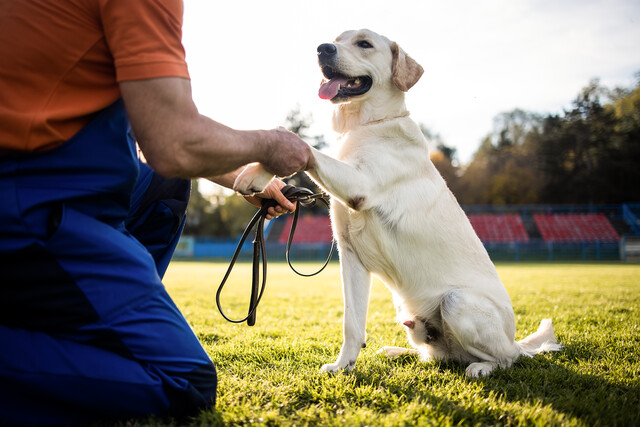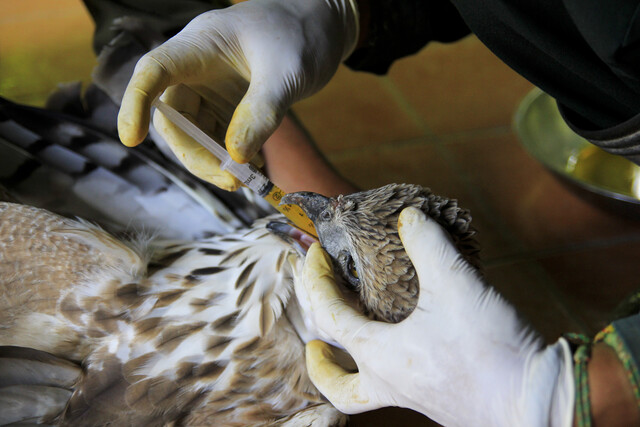Online Class: Dog Psychology 101

-
12Lessons
-
20Exams &
Assignments -
6Hours
average time -
0.6CEUs
Course Description
Are you a dog enthusiast, a proud pet owner, or simply curious about the intricate world of our four-legged companions? Dive deep into the fascinating realm of dog psychology with this comprehensive course, designed to unravel the mysteries of the canine mind. This is not just another course; it's a transformative journey into the heart and soul of every dog.
Our curriculum ventures beyond the superficial, laying bare the intricate tapestry of thoughts, senses, emotions, and behaviors that define dogs. Starting with an exploration of the essence of dog psychology, we'll navigate the profound corridors of their minds, delving into their acute senses, diverse personalities, temperaments, and intricate social constructs.
Why does your furry friend behave in a certain manner? What's the story behind that wagging tail, or those soulful eyes staring back at you? Equip yourself with the knowledge to decode dog aggression, understand their body language cues, and master effective training and discipline techniques.
But there's more. Discover the science of exercise tailored to dogs, learn the nuances of their developmental stages, and garner insights on caring for an aging canine companion. This course isn't merely about understanding dogs; it's about forging a deeper, more meaningful bond with them.
By embarking on this learning voyage, you're not just gaining academic knowledge. You're acquiring a toolkit that will profoundly enhance your personal and, if applicable, professional interactions with dogs. For those in canine-related professions, this course offers a distinct edge, enabling you to apply this knowledge for improved outcomes. And if you've ever felt apprehensive around dogs, this education serves as a bridge, transforming fear into familiarity and understanding.
Upon culminating this immersive course, you'll be armed with an integrated perspective on dogs. From selecting the perfect canine companion, fostering strong bonds, instilling new behaviors, to nurturing them in their twilight years - every stage of their life becomes a rewarding experience for both of you.
Join us on this enlightening expedition into the canine psyche. Let's deepen our connection with these incredible creatures, understanding them better, and in the process, discovering more about ourselves. Your journey into the world of dog psychology starts here!
- Business
- Business Ethics Courses
- Harassment Prevention Courses
- Human Resources Certifications
- Management
- Aromatherapy Courses
- Caregiver Courses
- Career Development Courses
- Communications Courses
- Confidence and Self Esteem Courses
- Healing
- Human Anatomy Courses
- Medical Skills
- Health & Medicine
- Nutrition
- Marketing
- Microsoft Office Certification Courses
- Life Coaching Courses
- Self-Improvement
- Small Business Certifications
- Safety
- Writing Improvement
- Business Writing Courses
Course Lessons
Lesson 1. The Science of Dog Behavior
 Lesson 1 Video
Lesson 1 Video Review Practice Worksheet: Lesson-1-HomeWork-11776.pdf
Review Practice Worksheet: Lesson-1-HomeWork-11776.pdf Lesson discussions: Dog Psychology Course; Reasons for Taking this Course
Lesson discussions: Dog Psychology Course; Reasons for Taking this Course Assessment: Lesson 1 Review Exam
Assessment: Lesson 1 Review Exam
Lesson 2. Dog Intelligence 101
 Lesson 2 Video
Lesson 2 Video Review Practice Worksheet: Lesson-2-WorkSheet-11777.pdf
Review Practice Worksheet: Lesson-2-WorkSheet-11777.pdf Assessment: Lesson 2 Review Exam
Assessment: Lesson 2 Review Exam
Lesson 3. How Dogs Perceive Their Environment
 Lesson 3 Video
Lesson 3 Video Review Practice Worksheet: Lesson-3-HomeWork-11778.pdf
Review Practice Worksheet: Lesson-3-HomeWork-11778.pdf Complete: Lesson 3 Activity
Complete: Lesson 3 Activity Assessment: Lesson 3 Review Exam
Assessment: Lesson 3 Review Exam
Lesson 4. From Anxiety to Assurance: Helping Dogs Navigate Fear
 Lesson 4 Video
Lesson 4 Video Review Practice Worksheet: Lesson-4-HomeWork-11779.pdf
Review Practice Worksheet: Lesson-4-HomeWork-11779.pdf Complete: Lesson 4 Activity
Complete: Lesson 4 Activity Assessment: Lesson 4 Review Exam
Assessment: Lesson 4 Review Exam
Lesson 5. Dog Personality Insights
 Lesson 5 Video
Lesson 5 Video Review Practice Worksheet: Lesson-5-WordSearch-11780.pdf
Review Practice Worksheet: Lesson-5-WordSearch-11780.pdf Complete: Lesson 5 Activity
Complete: Lesson 5 Activity Assessment: Lesson 5 Review Exam
Assessment: Lesson 5 Review Exam
Lesson 6. Canines and Companionship: Dogs' Social Nature
 Lesson 6 Video
Lesson 6 Video Review Practice Worksheet: Lesson-6-WorkSheet-11781.pdf
Review Practice Worksheet: Lesson-6-WorkSheet-11781.pdf Assessment: Lesson 6 Review Exam
Assessment: Lesson 6 Review Exam
Lesson 7. Understanding Dog Aggression
 Lesson 7 Video
Lesson 7 Video Review Practice Worksheet: Lesson-7-WordSearch-11782.pdf
Review Practice Worksheet: Lesson-7-WordSearch-11782.pdf Assessment: Lesson 7 Review Exam
Assessment: Lesson 7 Review Exam
Lesson 8. Positive Reinforcement: The Key to Effective Dog Training
 Lesson 8 Video
Lesson 8 Video Review Practice Worksheet: Lesson-8-Activity-11783.pdf
Review Practice Worksheet: Lesson-8-Activity-11783.pdf Complete: Lesson 8 Activity
Complete: Lesson 8 Activity Assessment: Lesson 8 Review Exam
Assessment: Lesson 8 Review Exam
Lesson 9. Unlocking Canine Emotions through Body Language
 Lesson 9 Video
Lesson 9 Video Review Practice Worksheet: Lesson-9-Activity-11784.pdf
Review Practice Worksheet: Lesson-9-Activity-11784.pdf Lesson discussions: Body Language
Lesson discussions: Body Language Assessment: Lesson 9 Review Exam
Assessment: Lesson 9 Review Exam
Lesson 10. The Essence of Positive Dog Discipline: Teaching Instead of Punishing
 Lesson 10 Video
Lesson 10 Video Review Practice Worksheet: Lesson-10-WorkSheet-11785.pdf
Review Practice Worksheet: Lesson-10-WorkSheet-11785.pdf Complete: Lesson 10 Activity
Complete: Lesson 10 Activity Assessment: Lesson 10 Review Exam
Assessment: Lesson 10 Review Exam
Lesson 11. Workout and Play: Key to a Happy Dog
 Lesson 11 Video
Lesson 11 Video Review Practice Worksheet: Lesson-11-WorkSheet-11786.pdf
Review Practice Worksheet: Lesson-11-WorkSheet-11786.pdf Lesson discussions: Exercise
Lesson discussions: Exercise Complete: Lesson 11 Activity
Complete: Lesson 11 Activity Assessment: Lesson 11 Review Exam
Assessment: Lesson 11 Review Exam
Lesson 12. Boons of Canine Companionship: The Interplay of Psychology and Bonding
 Lesson 12 Video
Lesson 12 Video Review Practice Worksheet: Lesson-12-WorkSheet-11787.pdf
Review Practice Worksheet: Lesson-12-WorkSheet-11787.pdf Lesson discussions: What is your opinion of this course?; Program Evaluation Follow-up Survey (End of Course); Course Comments; Reasons for Taking this Course
Lesson discussions: What is your opinion of this course?; Program Evaluation Follow-up Survey (End of Course); Course Comments; Reasons for Taking this Course Complete: Lesson 12 Activity
Complete: Lesson 12 Activity Assessment: The Final Exam
Assessment: The Final Exam Assessment: Lesson 12 Review Exam
Assessment: Lesson 12 Review Exam
Learning Outcomes
- Demonstrate an understanding of canine body language, including interpreting ear positions and tail wags, to communicate more effectively with dogs
- Recognize the behavioral triggers in dogs, such as separation anxiety or boredom, and implement effective strategies to address these behaviors
- Demonstrate understanding of the different types of dog intelligence by identifying examples of instinctive, adaptive, and working intelligence in various breeds.
- Describe how breed influences a dog's capacity for specific tasks by comparing the working roles of Border Collies, Poodles, German Shepherds, and other breeds.
- Demonstrate an understanding of how dogs use their sense of smell to navigate the environment by identifying three specific examples from the lesson.
- Describe how a dog's vision differs from human vision by listing two characteristics mentioned in the lesson.
- Demonstrate knowledge of strategies to alleviate fear in dogs by applying techniques like gradual exposure and positive reinforcement in simulated environments.
- Recognize signs of fear in dogs by identifying body language cues like ears back, tail tucked, and avoiding eye contact within given scenarios.
- Demonstrate effective behavior modification techniques for shy dogs, including the use of positive reinforcement and desensitization, to build confidence and reduce fear.
- Identify and describe at least three key personality traits of dogs, including responsiveness and shyness, and explain their impact on training and interactions.
- Demonstrate techniques to manage separation anxiety and aggression in dogs using consistent training and socialization strategies.
- Identify key social behaviors in dogs and explain how breed and environment influence these behaviors.
- Recognize and describe the signs of canine aggression to intervene before the behavior escalates.
- Demonstrate mastery of lesson content at levels of 70% or higher.
Additional Course Information

- Document Your Lifelong Learning Achievements
- Earn an Official Certificate Documenting Course Hours and CEUs
- Verify Your Certificate with a Unique Serial Number Online
- View and Share Your Certificate Online or Download/Print as PDF
- Display Your Certificate on Your Resume and Promote Your Achievements Using Social Media

Student Testimonials
- "I though this course was very helpful. Even after having dogs my whole life, I still picked up some pointers that I will definitely be working on." -- Diana D.
- "I was very impressed with this course. It is my experience that any intro course should be somewhat difficult because of the many areas of study that need to be addressed. This course was both highly informative and pleasingly difficult." -- Richard N.
- "I learned a lot in this course, I work with dogs and it is helping me to read the dogs body language. So thank you." -- Cynthia G.
- "This course is a must for all dog owners & those that are thinking of becoming one. This course should be mandatory by all SPCAS before allowing anyone to own a dog." -- Tara F.
- "This course has been amazing love the instructors they did an excellent job I recommend this course to anyone who wants to learn more about dogs great course." -- Corey A.
- "The instructor was very prompt in grading and reviewing the lessons. never had to wait long to receive her response on my work. Very pleased with that !! Gave me the feeling that she was right there if I needed her assistance...very nice !!" -- Ginny J.
- "Instructor was quick to get back to you and was very encouraging, and the course was extremely helpful and interesting! I took a previous course out of pure interest as I love law, but not applicable as I am canadian, but the Dog Psycholgy course was practical, super helpful and extremely interesting!" -- Michaela W.
- "I found both the course and the instructor excellent." -- John H.
- "Amazing course, best one I've taken about Dog Physiology." -- Lantz F.
- "I really liked this course. The instructor was very helpful and responsive." -- Sandy G.






